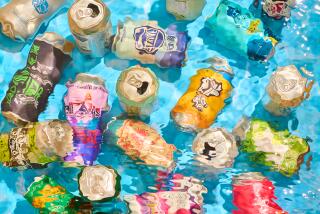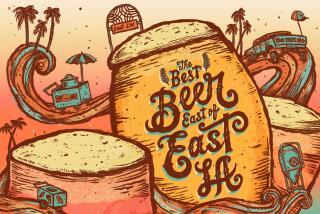This new seal means the beer you’re buying is actually made by an independent craft brewer
For years, a battle has been waged for the hearts and minds (not to mention pocketbooks) of the craft beer drinker, but unless you’re a dedicated beer lover, you’ve probably missed most of Big Beer’s secret war on the little guys. It’s a war fought in the beer aisle and in the local bars, as the world’s largest brewing companies move from simply copying the craft beer playbook into more aggressive tactics of acquiring craft beer brands to pit against their competitors. Now the craft beer industry is fighting back with an information campaign and declarations of independence.
Earlier this summer the Brewers Assn. — a trade organization that supports craft brewers — introduced a new tool in the fight against the big brewing companies: the independent craft brewer seal. The BA says they created the symbol to unify craft breweries from around the country. This symbol gives beer lovers an easy way to identify true small and independent craft brewers. The seal — an image of an inverted bottle and the words “independent craft” — is now appearing on packages of local craft beers, but what does it really mean and why should you care?
The BA is the arbiter of what “craft beer” means in the beer industry. Their definition has been argued about and tweaked over the years, but the idea is a brewery must be small, traditional and independently owned. There are specific requirements a brewery must meet for each of those criteria, but the most contentious detail of late has been what “independent” means.
As Anheuser Busch and other global brands (Constellation Brands and Heineken to name a few) continue to acquire small breweries around the country, it becomes harder to discern if that six pack you’re picking up at the grocery store is made by a small business down the street, or simply another brand in the portfolio of a mega-corporation. The little guys are inherently disadvantaged when competing with the deep pocketbooks, marketing acumen and economies of scale enjoyed by the big beer companies. But consumer research has shown that craft beer buyers do care about supporting small, local or independently owned breweries. The BA hopes the seal will give customers confidence that their beer money will support the craft brewers and not just the Anheuser Busch stockholders.
Some complaints about the aesthetic design and typography of the logo aside, the initiative has found widespread support throughout the craft beer industry, and Southern California breweries have begun to implement the design on bottles and cans. It can be a slow process to redesign and reprint labels and six-pack carriers, and the lead time on can designs is even longer, so the rollout will be gradual.
MacLeods Ale Brewing Co. in Van Nuys was one of the first Los Angeles area breweries to add the independent seal to their beers, and Alosta Brewing Co., Beachwood Brewing and others are following. Three Weavers Brewing in Inglewood says they’ve added the logo to bottles and six packs, but they won’t hit shelves until they’ve worked through their existing stock of bottles. El Segundo Brewing introduced six-packs of their hoppy core brews in August, and the independent seal is visible on the bottom of the six-pack carriers and case boxes. Some local breweries you won’t ever find the seal on are Golden Road Brewing (acquired by Anheuser Busch in 2015), Saint Archer Brewing (part of MillerCoors), San Diego’s Ballast Point (purchased for a billion dollars by Constellation Brands) and Lagunitas (now owned by Heineken).
So the next time you’re on a beer run looking for craft beer, you might want to look for the BA Independent Brewery seal while you’re checking the date code.
ALSO:
Culinary SOS: Jitlada’s Thai tea
11 easy weeknight grilling recipes
Pop-ups and perseverance: How this L.A. chef finally opened his restaurant
More to Read
Eat your way across L.A.
Get our weekly Tasting Notes newsletter for reviews, news and more.
You may occasionally receive promotional content from the Los Angeles Times.









